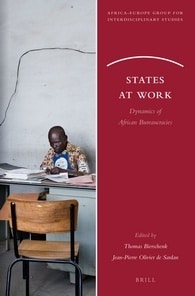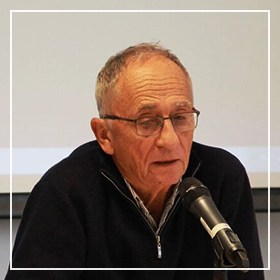‘States at Work’ aims to contribute to the academic debates on processes of state-building in Africa, and, among development practitioners, on the role of the state in development, by underpinning these debates with a much firmer empirical grounding than is often the case in the existing literature. It analyses the ‘real’ workings of states and public bureaucracies in different African countries. A second, related objective is to define the public services of the Global South, and in particular Africa, as a legitimate and productive object of anthropological enquiry. We argue that the basic, banal, routinized day-to-day functioning, practices and strategies of bureaucracies and public employees warrant the interest of anthropologists as much as warlords, smugglers and witchdoctors. A third objective is to develop a more intensive dialogue with the sociology of organization and bureaucracy in the North, while the latter would profit from taking the results of the ethnographies of states in the Global South into account.
Recent anthropological investigations of the state describe how the ‘idea’ of the state spreads in the social fabric or explore the state’s margins or interstices.
As for political science, it mainly emphasizes deviations from the official norms inspired by Western bureaucratic models. These deviations are frequently explained in terms of concepts such as clientelism and neopatrimonialism, and often with a culturalist bent.

Breaking with these approaches, this book focuses on the daily functioning of state services. We explore the mundane practices of state-making from three key, inter-related points of entry: first, the ethnography of public servants (bureaucratic cultures and practical norms, operational routines in offices, career patterns and modes of appointment etc.); second, the delivery of public services and goods (how bureaucrats themselves perceive and deliver the goods and services for which their departments have responsibility and how they construct their everyday relationships with service users); and third, the accumulation of public administration reforms (how the different bureaucratic corps react to the ‘good governance’ discourse and new public management policies; the consequences of these reforms for the daily working of state bureaucracies and for the civil servants’ identities and modes of accountability; the space that exists for bottom-up micro-reforms that build on local innovations or informal arrangements).
The state as a heterogeneous bundle of practices
The contributions to this book focus on ‘doing’ the state, on state-making (and un-making) practices. For us, the ‘state’ should be seen not as an entity but as a bundle of practices and processes in a field of complex powers. Such processes can run in different directions with diverse effects.
We start from the premise that the state is no longer the only carrier of effective government (if it ever was), and that it is increasingly confronted with other actors, with which it is in overlapping and complex relations of conflict, negotiation, alliance, compromise, avoidance, etc. With regard to Africa, a plurality of power centres within and adjacent to, and partially intertwined with the state, is widely recognized. Therefore, in many cases several actors are involved in the delivery of public services in Africa today: state administrations, international actors such as NGOs and international donor organizations, community-based organizations, and private companies. On the other hand, state agencies remain strong, although not exclusive, actors in these fields.

A contribution to the study of the state, in the Global South and beyond
The ethnographic scrutiny of state phenomena undertaken in this book claims to make an original contribution to research on the state in general as well as to the discipline of anthropology. While studies on modern forms of the state are the preserve of political science, the sociology of organizations and administrative science, it is through its method that anthropology can contribute added value. The approach used by most contributors to this book has been to apply the fieldwork practices routinely used by anthropologists to topics that originate in the political sciences and the sociology of organizations, and to do this in an African context, which is rarely the focus of such perspectives. Such an approach opens up new lines of questioning and new forms of knowledge, especially when it systematically takes actors’ viewpoints into account, observes their actual practices and undertakes in-depth case studies or analyses of interactions in situ.
But the studies the findings presented in this book can, to a certain extent and in certain respects, be ‘exported’ elsewhere from Africa, or ‘translated’ into other contexts and initiate a dialogue with research on the state in the countries of the North. Practices in Africa and in Europe do not differ in nature. Irrespective of their location, all practices in all modern states display both permanent and multi-faceted disparities between the official model, which state actors are supposed to follow, and actual behaviour. This is a common feature of all organizations, be they public or private. In Africa as in Europe, all public bureaucracies are permeated by tensions between prescribed and real conduct, between official and practical norms, between organizational charts and professional cultures, and between public policies and their implementation. Bureaucracies are, without exception, subject to a host of contradictory directives. Competing rationales, overlapping power structures, shifting alliances and different conflicts clash endlessly.
This does not mean, of course, that the substance, scale, style and nature of these tensions, directives, rationales, alliances and conflicts are identical in Africa and Europe. Quite the reverse: the contexts in which they occur are different, as are the issues and strategies. The codes, points of reference, forms of non-verbal communication and social norms diverge.
Certain forms of behaviour in the context of the state that are less pronounced in Europe, and hence barely discernible, assume such proportions in Africa that they could not, as it were, escape the attention of either citizens or researchers.
The many kinds of corrupt transactions are a significant case in point, another being the role of personal connections within the working environment. They are also present in Europe, of course, but much are better hidden or disguised. The specificity of the practices engaged in by public employees in Africa highlights forms of behaviour that are more difficult to detect in Europe, either because they occur on a smaller scale or because they take a different form.

For anthropology as empirical social science
Our comparative venture concerning the modern state also entails a plea for a new relationship between anthropology and the other social sciences, as well as for innovations within anthropology itself.
For reasons that are both historical and institutional, anthropology is inclined to be self-referential and inward-looking. In celebrating the uniqueness of its method, its approach and objects, especially when the latter are perceived – by Europeans – as ‘exotic’, and in adopting a culturalist stance, it all too often forgets that other social sciences have dealt with the same objects or conducted the same kind of research in different areas.
In this book, we have attempted to correct this trajectory, as far as possible, by engaging in a wide-ranging dialogue with history, sociology and political science, not only when they deal with the state, its machinery and its practices in an African context (which, sadly, is all too infrequently), but also when they deal with these objects in a European or American context (which is the norm)
Oddly, anthropology is more inclined to align itself with philosophy, especially political philosophy, than with its closest disciplinary (and empirically-oriented) neighbors. It is as though many anthropologists preferred the ethereal realms of highly generalized, speculative forms of interpretation to empirically grounded and methodically controlled forms of comparativism applied to specific historical configurations. There is obviously no question of banning all dialogue with philosophy but instead of promoting, as a matter of priority, a different kind of dialogue, a dialogue with the empirical social sciences which investigate the same objects in the Northern hemisphere as contemporary anthropology in the South. This would involve a triple dialogue: anthropology’s dialogue with history, sociology and political science; dialogue between Africanist and non-Africanist researchers; and dialogue between researchers from the North and the South.
Authors and topics of this book
The authors of this book originate from different European (Denmark, France, Germany, Italy, United Kingdom) and African (Benin, Niger) countries, wrote the original versions of their paper in different languages, and work at the confluences of several social sciences (anthropology, history, political sciences, management sciences). A majority, however, are anthropologists, which undoubtedly explains the general prevalence of a qualitative approach.
The African states under consideration are not ‘failed states’ (like Somalia or the Democratic Republic of the Congo). They more closely resemble the modal type of African states, and this undoubtedly lends greater validity to the comparative lessons drawn from their study.
For reciprocal comparison
At the same time, however, this implies the adoption of a different approach to the making of comparisons. Traditional anthropological comparativism was concerned with closed systems (cultures and societies) – which should be considered as passé. Contemporary anthropological comparativism, more often than not, is quick at establishing direct if fragile connections between anecdotal local observations and theories of the global. We are advocating a third type of comparativism, which spreads progressively outwards from a solid empirical base: (a) an intensive, multi-site comparativism pursued in the field; (b) a comparativism based on regional and thematic affinities, comparing similar institutions in historically related local and national contexts (such as bureaucracies in Africa, to take the present volume as an example); (c) a wider level of comparison involving similar processes in very different historical or spatial contexts (such as the police in Benin and in Germany).
Featured image by Christian Schnettelker (flickr, CC BY 2.0)







As the editor of the series in which ‘States at Work’ came out, let me take the opportunity to promote our open access policy: all volumes, this one included, are fully open access two years after publication. See http://aegis-eu.org/aegis-series-brill-open-access.